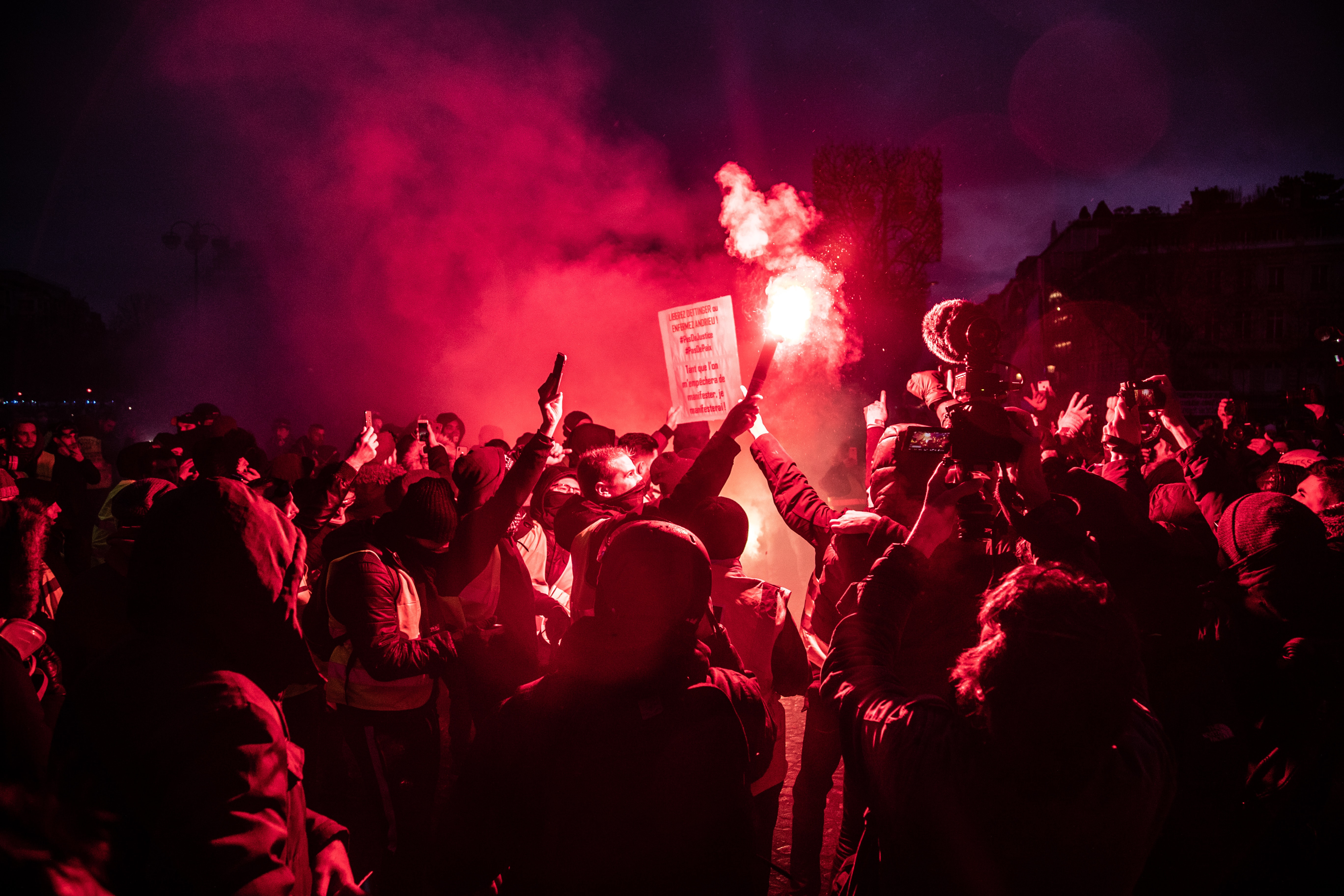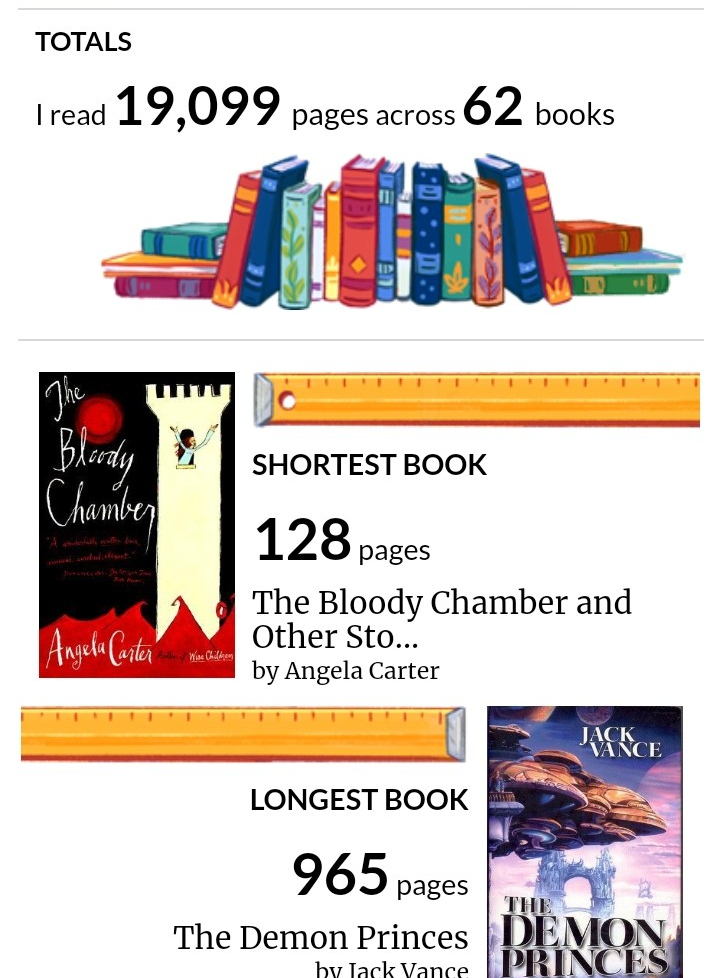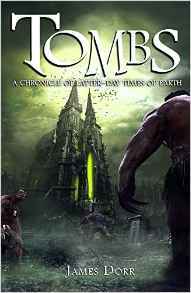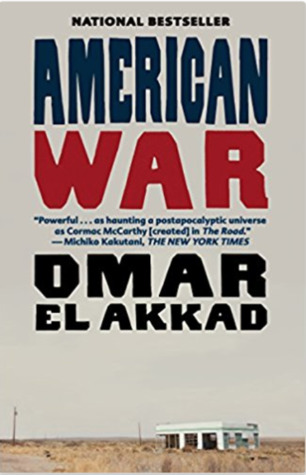Logline – When an ancient troll thaws out in modern day Washington state, three wannabe Vikings try to save their town by battling the monster the old fashioned way, with axes, swords, and Viking helmets.
Awards
Logline – When an ancient troll thaws out in modern day Washington state, three wannabe Vikings try to save their town by battling the monster the old fashioned way, with axes, swords, and Viking helmets.
Awards
It’s very short, but I wrote a story inspired and informed by the struggles of the oppressed everywhere.

Check it out here: thosewhodied

My goal was to read 77 books this year, a number I kinda pulled outta nowhere but also it’s my birth year and also, I think, what you get when you read the number of books as the month number (ie 1 book in January, 2 in february, 3 in march, 4 in april, etc.) Despite enlisting some quick reads towards the end of the year (we meet again, Fred Saberhagen) I wasn’t able to reach that goal. But 62 isn’t bad–and a couple of those books were omnibuses, so really it’s more like 66 or 67 anyway. At any rate, not a bad year!
As always, these are books that I read this year not necessarily that were published this year. I read much more nonfiction this year, and I enjoyed it, but as the order of this list shows, I’ll pretty much always prefer good fiction to good nonfiction.

The rarest of birds: Dying Earth that has little to do with Vance. The stories are repetitive and aren’t structured incredibly well, but that doesn’t matter. Many of the characters are unlikable and necrophilia comes up a lot more than you’d expect. That doesn’t matter either.
What matters is that this is purely original story-telling; the kind of writing that could only come from someone as skilled as Dorr.
Quote: “There are places in the Tombs that many do not wish to wander too near to, even those of us who care for the dead. We, the crypt-keepers, the resident living, avoid these not out of apprehension–that some tomb-wraith or other night-vision beneath a blistering moon might disturb our peregrinations–but rather for respect of the stories told of those who lie within.”

You know going into this that it’s going to be heavy. But it’s the little details that make it so tragic. Leeches in the mud. Alienation. Murderous Lies. This book is more important than the Khmer Rogue, more important than Cambodian history. It’s a study in humanity gone wrong, a real-life Cormac McCarthy nightmare.
Quote: “I have to go to the toilet,” I tell Ma urgently after dinner.
“You have to go in the woods.”
“But where?”
“Anywhere you can find. Wait, I’ll get you some toilet paper.” Ma goes away and comes back with a bunch of paper sheets in her hand. My eyes widen in disbelief, “Ma! It’s money. I can’t use money!”
“Use it, it is of no use to us anymore.”

I am not much of a tv watcher. Many shows I want to like but I just can’t get into. However, Fargo is well-written and non-formulaic. I like it more than the movie, even, which I know are bold words but there you go. This book was written by the show-runner of Fargo, so I was definitely curious.
This book isn’t nearly as good as Fargo. It’s not even really a book; more a collection of character studies. What keeps it trucking along is a sneaky amount of narrative tension that makes this book way more interesting than it objectively deserves to be.
Quote: “Everyone has their own path. The choices they’ve made. How any two people end up in the same place at the same time is a mystery. You get on an elevator with a dozen strangers. You ride a bus, wait in line for the bathroom. It happens every day. To try to predict the places we’ll go and the people we’ll meet would be pointless.”

Shamefully, this is the only Lessing book I’ve read. And I liked this fascinating tale of a slowly enveloping apocalypse. As engaging as it was, though, I often found it hard to get through. I think because there really is no plot and not really characters, just a slowly changing setting. Lessing called this an attempt at autobiography. I wonder if she considered herself the narrator or Emily. I suspect the core of autobiography, however, lies not in either character but in the following exchange.
Quote: “And I said, “You aren’t the first person to have that difficulty!”
“Yes, but it isn’t what we meant, what we planned. Gerald and I talked it over, right at the start; it was all discussed; there wasn’t going to be any of that old nonsense, people in charge telling people what to do, all that horrible stuff.”
I had said to her, “Everybody has been taught to find a place in a structure—that as a first lesson. To obey. Isn’t that so? And so that is what everybody does.”
“But most of these children have never had any education at all.”
She was all indignation and incredulity. A grown-up—a very grown up and responsible—question she was asking: after all, it is one that most adults never ask. But what had confronted me there had been a young girl in whose eyes kept appearing—only to be driven down, fought down—the needs of a child for reassurance, the sullen reproach against circumstances of a very young person, not an adult at all.
“It starts when you are born,” I said. “’She’s a good girl. She’s a bad girl. Have you been a good girl today? I hear you’ve been a bad girl. Oh, she so good, such a good chile.’ … Don’t you remember?”
She had stared at me; she had not really heard. “It’s all false, it’s go to do with nothing real, but we are all in it all our lives—you’re a good little girl, you’re a bad little girl. “Do as I tell you and I’ll tell you you are good.’ It’s a trap and we are all in it.”
“We decided it wasn’t going to happen,” she said.

I don’t think it quite lives up to the black mirror aspect, and it certainly could have been even harsher a reflection upon the US Empire, but as pure cli-fi it’s some of the best I’ve ever read. It reads as a thriller and only upon reflection do you see how inverted the tropes and assumptions are.
Quote: “Sarat thought about how easy it would be to fix the mistake, to simply redraw the stars properly. But she knew that even broken history is history. The stars, cast wrong, must remain that way. It would be more wrong to change them.”

An epic noir tale that feels like the blueprint for so many Coen brothers films. Sharp dialogue, morally grey characters, a plot that twists and turns … this is for me even better than Maltese Falcon and probably the finest bit of noir fiction I’ve read.
Quote: “I first heard Personville called Poisonville by a red-haired mucker named Hickey Dewey in the Big Ship in Butte. He also called his shirt a shoit. I didn’t think anything of what he had done to the city’s name. Later I heard men who could manage their r’s give it the same pronunciation. I still didn’t see anything in it but the meaningless sort of humor that used to make richardsnary the thieves’ word for dictionary. A few years later I went to Personville and learned better.”

The premise of this book is stupendous of course. The Devil makes mischief in Moscow under the Beltane moon. Seeing the buffoonery of petty officials is rather fun. A lot of the details I really like; the setting feels real.
The problem for me is the Pontius Pilate story. I’m really not sure how it works at all, other than as jeebus propaganda or perhaps boring good vs evil themes. Doesn’t feel at all necessary and in fact, for me, detracts from the theme and the work in general. I’d rank it lower but something tells me that I’m missing something important.
Quote: “Is that vodka?” Margarita asked weakly.
The cat jumped up in his seat with indignation.
“I beg pardon, my queen,” he rasped, “Would I ever allow myself to offer vodka to a lady? This is pure alcohol!”

The prose is so deliciously worth savoring that Carter has instantly moved into my upper echelon of favorite prose-ists. The stories themselves tend to be a bit one-note, perhaps deliberately, but the disparity of *what* is being told is noticeable with *how* it’s told. Still if you want to read some folk tales with amazing prose, this is the best place you could start.
Quote: “They will be like shadows, they will be like wraiths, gray members of a congregation of nightmare; hark! his long wavering howl . . . an aria of fear made audible.
The wolfsong is the sound of the rending you will suffer, in itself a murdering.”

Kesey is better known for Cuckoo’s Nest and perhaps Sometimes a Great Notion, or perhaps for his role as a Merry Prankster. This book is hardly ambitious and there’s a reason it’s not considered his best. But it’s so high on my list because a) The Pendleton Roundup should not be this interesting and b) Kesey’s ability to create believable, likeable characters is frickin’ ridiculous.
Quote: “’It didn’t take me long to appreciate what a rare pair had sailed into my life. Even the most naive of eyes could see that these were a couple of real old-time dime-western ripsnorters. The black cowboy was the smaller of the pair but he made up for it with his mouth: it was bright as the moon dancing in the stars over his shoulder. He introduced himself as Mister Fletcher but just call him George, and his taciturn partner as Mister Jackson. ‘You can call him Sun Gone Jack Down or Dog gone Sun Jack or anything thereabouts-Injun names’re always changing.”

If there’s a pattern to my books this year, it’s that I’m really chuffed when I find a book that doesn’t feel like a lot of other books I’ve read. The ability to write a unique vision, free of cliches and tropes, is what catches my fancy these days. Thus my favorite book of the year is utterly quiet.
There’s really no plot and certainly pretty small stakes. And that’s exactly why I enjoyed it so much. The ability to tell an engaging story without having to include life-and-death consequences is increasingly a lost art.
The scenes in this book feel cinematic but it’s really the best of both world’s as we live in the narrator’s head. The fact that it’s about a (would-be) relationship is beside the point–instead what makes this so readable is the concrete feeling that these characters are real.
Quote: “I felt a sudden rush of warmth in my body, and felt the tears well up once again. But I didn’t cry. It’s always better to drink than to cry.”